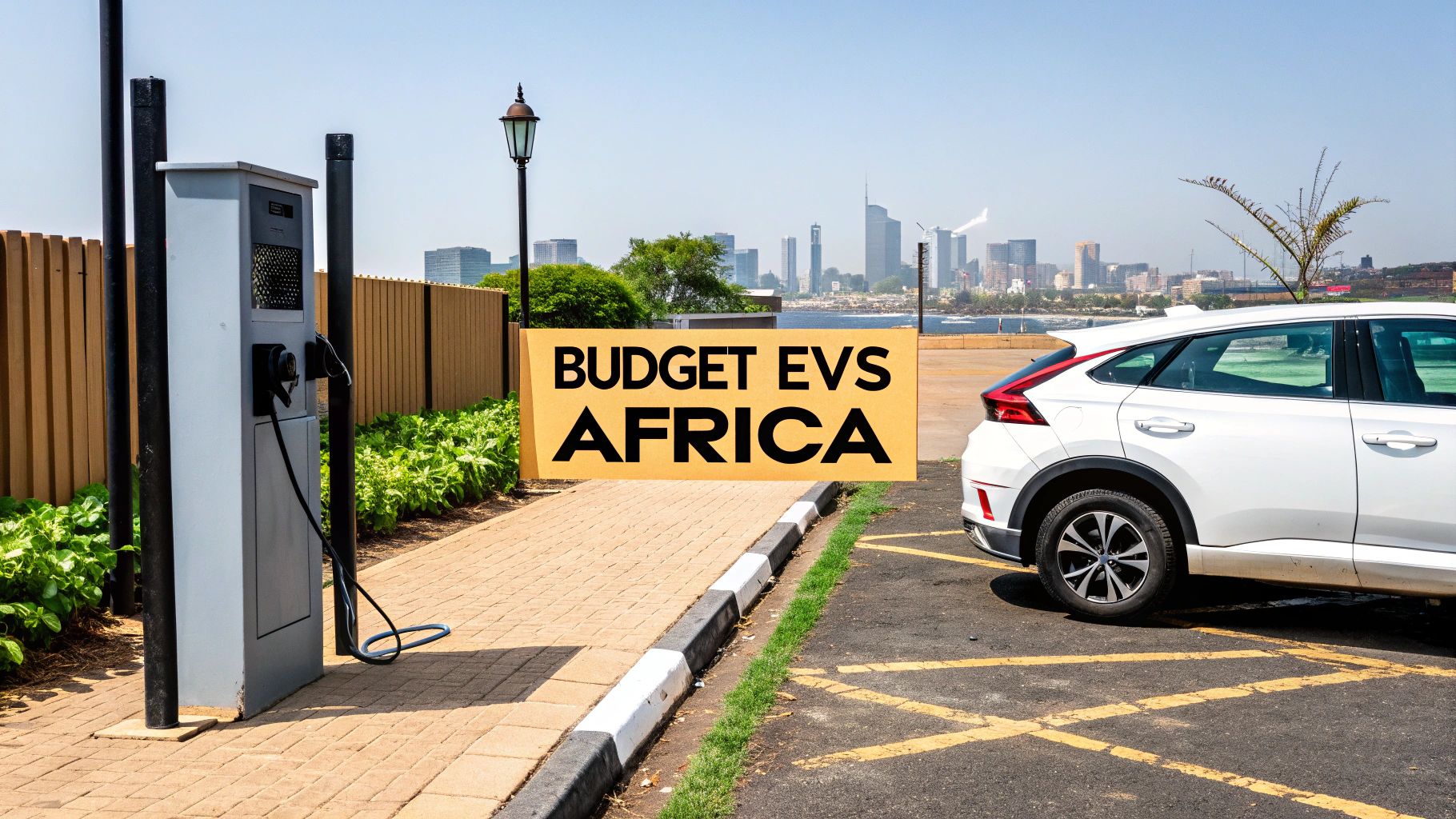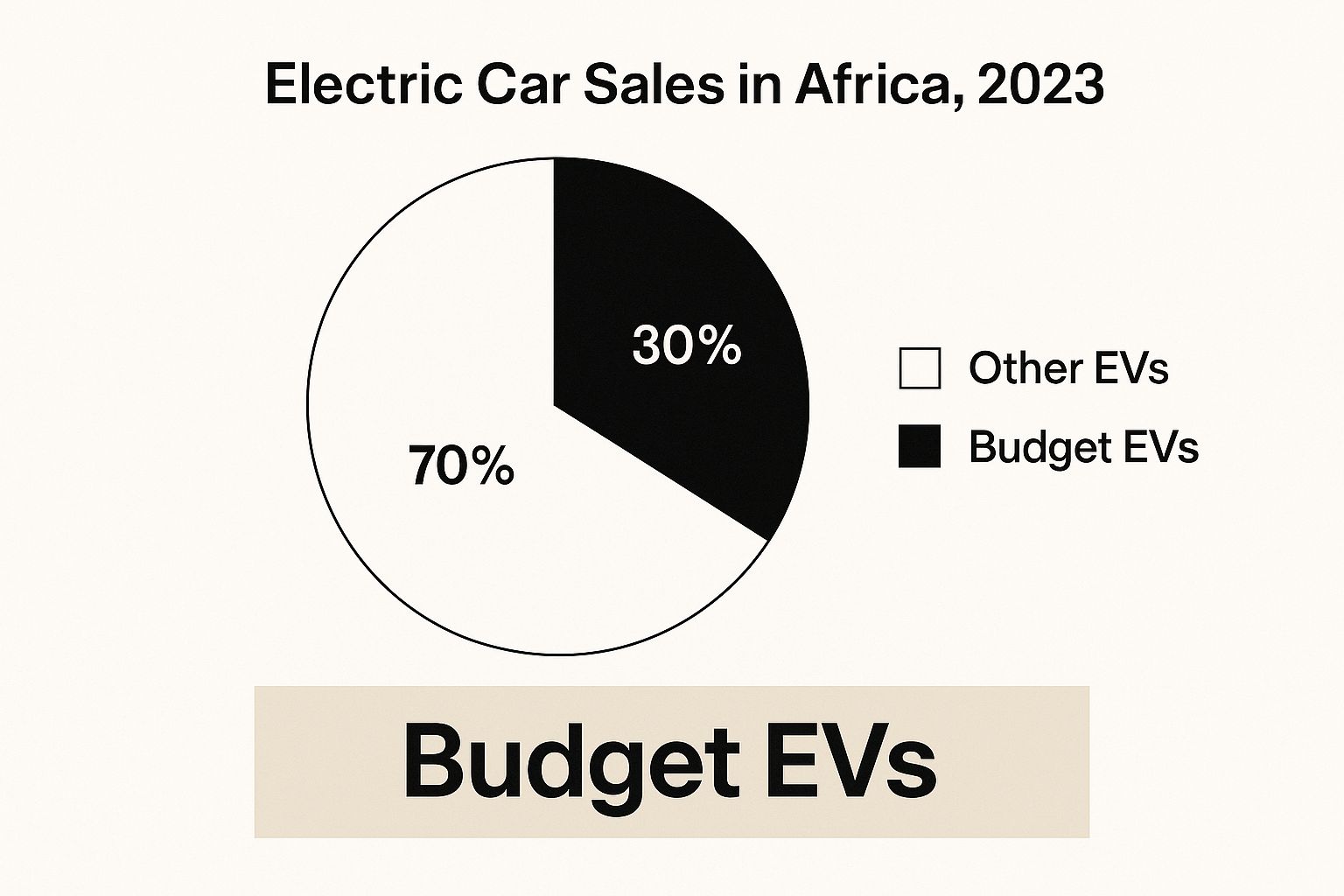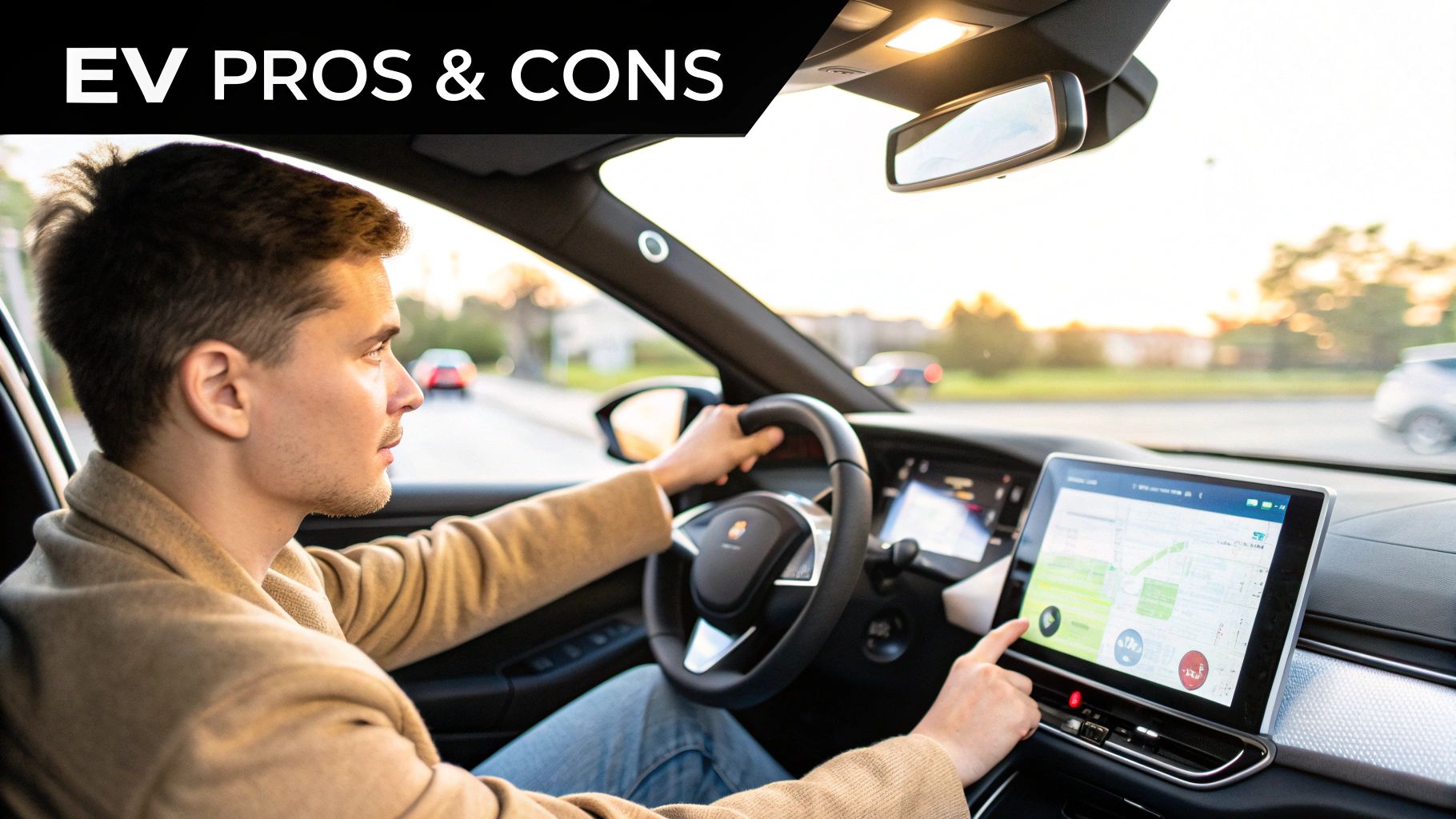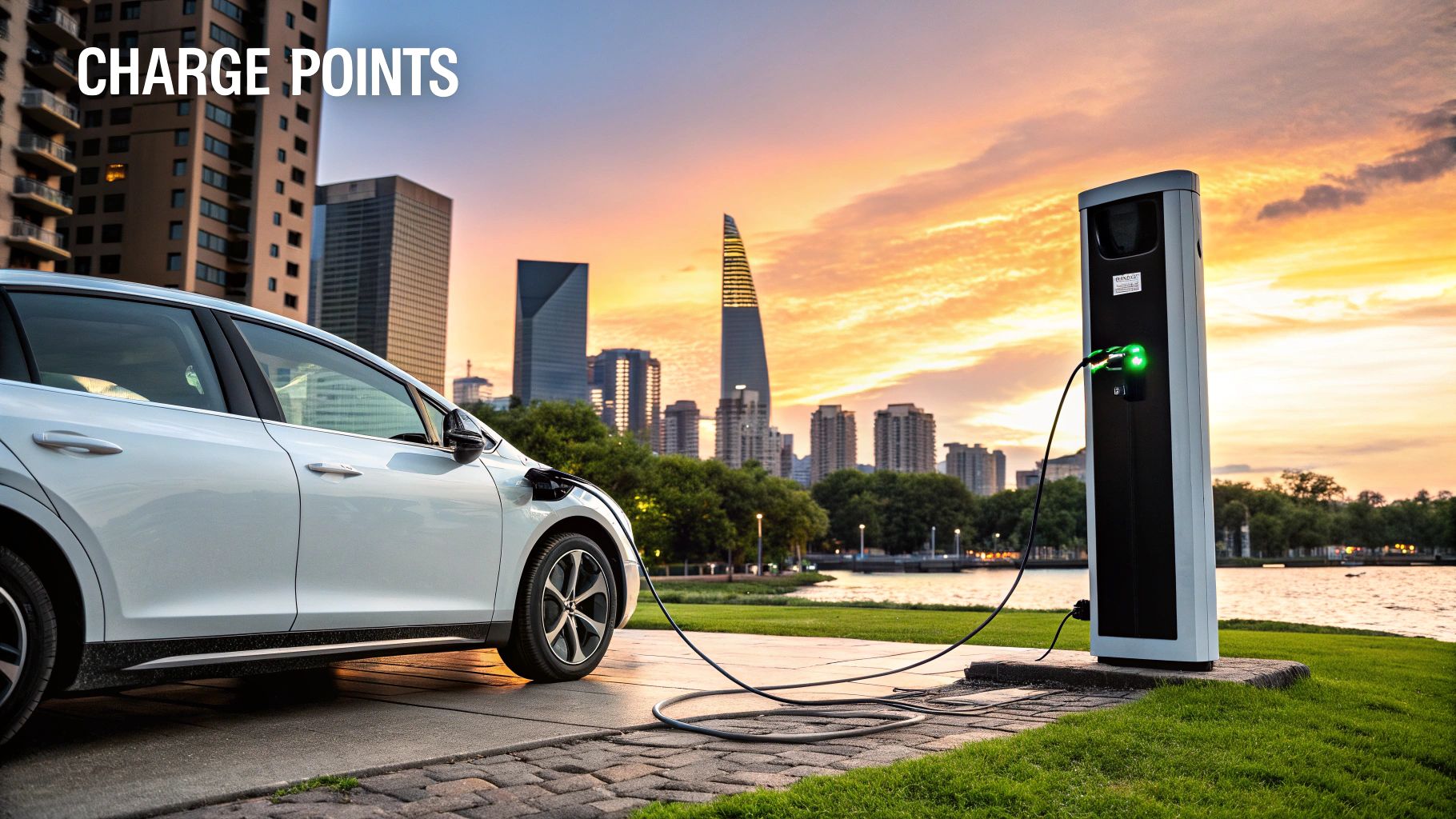
Finding the cheapest electric cars in Africa isn't the challenge it used to be. As the market opens up, a new wave of affordable models, mostly from brands like BYD, Geely, and Leapmotor, is finally making electric driving a real possibility without the hefty price tag.
What's Behind the Growing Market for Affordable EVs in Africa?
The electric vehicle (EV) scene across Africa is buzzing with activity. It's a noticeable shift, driven by everything from eye-watering fuel prices and a growing eco-consciousness to governments finally getting on board with supportive policies. What was once a luxury item for a select few is quickly becoming a practical choice for everyday transport. The momentum is real, and it feels like a turning point for electric mobility on the continent.
The Real Drivers of EV Adoption
So, what's actually fuelling this demand for affordable EVs? If you're thinking about buying one, it helps to understand the forces at play.
- The Squeeze at the Pump: Let's be honest, unpredictable and constantly rising petrol prices make the low running costs of an EV look very attractive. The long-term savings on fuel and maintenance can genuinely make up for the initial cost of the car.
- A Nudge from the Government: More and more nations are actively encouraging people to switch to electric. Things like import tax exemptions and lower registration fees directly reduce the cost of getting into an EV.
- More Cars to Choose From: Chinese manufacturers, especially BYD and Geely, are being smart about this. They’re introducing models built for affordability and practicality, aiming squarely at emerging markets and expanding their dealership networks to match.
The numbers back this up. The African EV market was valued at $15.63 billion in 2023 and is expected to hit $28.30 billion by 2030. South Africa is leading the charge, with sales of new energy vehicles jumping by a massive 83% in early 2024 compared to the year before. While some countries are still catching up, policy changes in places like Rwanda—which has scrapped import taxes entirely—are making EVs cheaper and more accessible across the region. You can dig into more data on the growth of EV sales in Africa.
The combination of financial pressure from fuel costs and smart government policies is creating the perfect environment for an affordable EV market to thrive. This is about more than just new tech; it’s about making sustainable transport genuinely accessible for African drivers.
This guide is here to help you make sense of it all. We’ll break down the cheapest electric cars available in Africa, comparing their prices, specs, and how they actually perform in the real world. Finding an affordable EV is easier now than ever, and we'll help you find the right one.
A Closer Look at the Top Budget-Friendly Electric Cars
When you start shopping for an affordable electric car in Africa, it’s easy to get lost in the marketing noise. To make a smart choice, you have to look past the shiny brochures and compare the top contenders on what really matters for driving on our roads every day. Let's put the most accessible models making their way into showrooms under the microscope.
We’ll focus on the key players like the BYD Dolphin, Leapmotor T03, and the incredibly cheap Geely Panda Mini. Each of these cars fills a specific niche, and figuring out their unique strengths is the first step. This comparison is all about real-world factors: how far can you actually go on a charge, how practical is it to top up the battery, and is it a good fit for local driving conditions?
The City Commuter Versus the Family All-Rounder
First things first: you need to match the car to your life. A small, agile EV with a modest range could be the perfect tool for zipping around town, but a family will need more space and enough battery to handle longer journeys.
Take the Geely Panda Mini. With a price tag sitting around $5,880 USD and a 200 km range, it’s unashamedly built for the city. Its tiny footprint is a massive advantage for navigating congested streets and squeezing into tight parking spots. It's the ideal runabout for the daily commute to work or the school run.

At the other end of the budget-friendly spectrum, you'll find the BYD Dolphin. It comes in closer to $11,800 USD but delivers a much more flexible package. Its 44.9 kWh battery gives it a solid 420 km range, transforming it from a simple city car into a genuine option for small families needing to travel between towns on the weekend. You can find more details on these affordable electric cars in Africa on ev24.africa.
A Head-to-Head Spec Showdown
To really see what sets these cars apart, let's look at the numbers. The Leapmotor T03 slots neatly into the middle, costing around $10,000 USD and offering a 403 km range from its 41.3 kWh battery. It goes head-to-head with the Dolphin, giving you a similar range in a slightly more compact, budget-focused design.
It's not always about the maximum range. A key differentiator is often how efficiently a car uses its battery and, crucially, how fast it can be recharged. For some drivers, a slightly smaller battery that charges quickly is far more practical than a huge one that needs to be plugged in all night.
Africa's Most Affordable EV Models Compared
To help you visualise the options, here’s a straightforward comparison of these leading models. This table gives you a quick overview of the key specifications and estimated pricing for the most budget-friendly EVs you're likely to find across various African markets.
| Model | Estimated Price (USD) | Battery Size (kWh) | Estimated Range (km) | Ideal Use Case |
|---|---|---|---|---|
| BYD Dolphin | ~$11,800 | 44.9 kWh | 420 km | Small families, versatile use |
| Leapmotor T03 | ~$10,000 | 41.3 kWh | 403 km | Budget-conscious commuters |
| Geely Panda Mini | ~$5,880 | 17.0 kWh | 200 km | Purely urban, short trips |
This table makes the trade-offs crystal clear. The Geely Panda Mini has an unbeatable entry price, but its limited range confines it strictly to city limits. The BYD Dolphin and Leapmotor T03, on the other hand, offer much more freedom, making them suitable for a wider range of needs. For many, the slightly higher price of the Dolphin will be easily justified by its larger battery and more family-friendly design. As you explore the cheapest electric cars in Africa, these are the kinds of distinctions that will help you make the right call for your situation.
Understanding the Total Cost of EV Ownership
When you're looking at the cheapest electric cars in Africa, the price tag you see at the dealership is only page one. The real story of affordability unfolds over the lifetime of the vehicle, and that's where the Total Cost of Ownership (TCO) comes in. It’s a broader look that includes all the running costs, maintenance bills, and other expenses you’ll face. For an EV, the true financial perks often start showing up months, or even years, down the road.
The biggest win, and the most immediate one you'll feel, is at the fuel pump—or rather, the lack of one. Petrol prices can be incredibly unpredictable across the continent, but electricity costs are far more stable. Charging your EV at home, especially if you can plug it in overnight on off-peak tariffs, is almost always significantly cheaper than filling up a tank. For the average driver, this shift can easily add up to hundreds of dollars in savings every single year.

To get a really sharp estimate of what you'll be spending, it helps to know how to calculate electrical energy consumption for charging. This lets you figure out what your monthly "fuel" bill will look like with surprising accuracy.
Breaking Down Maintenance and Other Expenses
Another huge financial upside is how little maintenance an EV needs. Electric cars are just mechanically simpler, with way fewer moving parts than a traditional petrol or diesel car. Forget about oil changes, spark plug replacements, or fixing a busted exhaust system.
Your new maintenance checklist will be refreshingly short:
- No More Oil Changes: Since there's no engine oil, you can cross that regular, recurring cost right off your list.
- Brakes That Last: EVs use something called regenerative braking, which uses the motor to slow the car down while putting a little charge back into the battery. This means your brake pads and discs don't work as hard and often last twice as long as they would on a standard car.
- Fewer Fluids to Worry About: You'll still have brake fluid and coolant to keep an eye on, but the long list of fluids an internal combustion engine needs is gone.
Of course, there are a couple of other costs to think about. Many new owners choose to install a dedicated Level 2 home charger. It's a one-off expense, and while you can charge from a regular wall socket, a proper home unit makes charging much faster and way more convenient for daily driving.
The real financial power of an EV lies in its simplicity. By eliminating dozens of mechanical components prone to wear and tear, an electric car not only saves you money on parts and labour but also reduces the time your vehicle spends in the workshop.
The Battery Health Consideration
The elephant in the room for any potential EV owner is the battery. Over many years, an EV’s lithium-ion battery will slowly lose some of its ability to hold a full charge, which reduces its maximum range. This isn't a surprise; it's a known characteristic of the technology.
Thankfully, modern EV batteries are built to last. Most come with a manufacturer's warranty of around 8 years or 150,000 km, and the reality is that a battery replacement is the single biggest potential expense you could face.
But for most people, it’s a far-off problem. The vast majority of drivers will sell or trade in their EV long before the battery becomes a serious issue. If you're looking at a used EV, however, getting a battery health report is an absolute must. It’s the single most important factor affecting the car's value and how useful it will be for you. Keeping these long-term factors in mind gives you the full financial picture, helping you balance the initial purchase price against the very real savings you'll make over time.
Navigating Import Duties and Local Availability

Finding an EV with an attractive price tag is just the first step. The real challenge often lies in getting it from the showroom to your driveway without the cost ballooning, and this is especially true across Africa. The final price you pay is tangled up in a web of import duties, shipping fees, and local taxes that swing wildly from one country to the next.
These extra costs can easily tack on thousands of dollars, pushing a supposedly budget-friendly car into a much higher price bracket. It's a make-or-break factor. For instance, one country might levy heavy tariffs to shield its local auto industry, while its neighbour offers generous tax breaks to get more EVs on the road. This creates a real patchwork of affordability, where the same exact car can cost drastically different amounts depending on where you live.
The Power of Policy Exemptions
At the end of the day, government policy is the biggest lever for making EVs affordable. Take Rwanda, for example. The government there has completely waived import and excise duties on electric vehicles. This single move dramatically cuts the final cost, letting consumers buy EVs at prices much closer to what they'd cost in their country of origin.
This is a world away from countries with high tariffs still in place. It's why doing your homework on local regulations is absolutely essential before you even think about buying. You need to get clear on:
- Value-Added Tax (VAT) on vehicle imports.
- Excise duties that might apply to cars or luxury goods.
- Port handling and clearance fees, which always add up.
To get a clearer picture, our guide comparing EV import duties in different African countries is a great place to start. It breaks down what you can expect to pay based on your specific location.
A country’s tax policy is often the deciding factor between an affordable EV and an unattainable one. A 0% import duty, like Rwanda’s, can save a buyer more than 25% on the vehicle’s landed cost, fundamentally changing the economic equation of ownership.
The Rise of Local Assembly
Right now, most EVs in Africa are imported. But the real game-changer for long-term affordability will be local assembly. Building cars on the continent sidesteps many of the steep import tariffs and slashes shipping costs—two of the biggest factors that inflate the final price.
While Rwanda doesn't have much local assembly just yet, the trend is picking up steam in the region. South Africa, for one, is poised for a significant increase in local EV production, backed by government investments of around R1 billion to build a domestic EV value chain. The whole idea is to bring down costs by becoming less reliant on imports. If successful, this is a model that could be rolled out across the continent, making the cheapest electric cars in Africa truly accessible to the average person. You can read more about South Africa's EV production goals on imotonews.co.za.
How to Choose the Right Affordable EV for You
Picking from the most affordable electric cars in Africa isn’t about finding a single "best" vehicle. The real goal is to find the right car for your specific, day-to-day life. All the specs and data in the world are meaningless until you filter them through your daily routine, your budget, and the roads you actually drive on.
The first step is to be brutally honest about your driving habits. Are you mostly zipping through city traffic on your way to work, or do you regularly need to make longer trips between towns? This one question is the key to narrowing down your options and avoiding a costly mistake.
Matching a Car to Your Lifestyle
Let’s get practical and break this down into a few common scenarios. Every driver has different priorities, which means the "best" car will be different for each. Seeing where you fit in this picture can make the choice much easier.
-
The Urban Professional: Your life is mostly short, predictable commutes in a busy city. You care more about squeezing into tight parking spots and keeping running costs low than you do about raw power or a massive range. Getting through urban gridlock without the fuss is your main goal.
-
The Small Family: You need a car that can do a bit of everything. It has to handle the daily school run and weekly grocery shop, but also be ready for a weekend drive to visit family or see the sights. For you, safety, boot space, and a respectable range are what really count.
-
The Ride-Hailing Driver: Your car is your business. Every kilometre counts, and your income depends on efficiency and rock-solid reliability. You need to squeeze the most range out of a single charge and keep downtime to an absolute minimum. The lowest possible cost per kilometre is your bottom line.
Scenario-Based Recommendations
When you think about it this way, the right car starts to stand out. A perfect vehicle for one person could be totally wrong for another, which just goes to show why your own context is everything.
The Geely Panda Mini is the clear winner for the dedicated urban professional. Its tiny footprint is a dream for city parking, and its 200 km range is more than enough for daily errands. At its price point, the value is simply unbeatable for someone who lives and works in the city.
For a small family, the BYD Dolphin really starts to make sense. That generous 420 km range means you can plan longer trips without constantly worrying about finding a charger. Plus, its roomy interior and five-star safety rating deliver the practicality and peace of mind every family needs. It hits a sweet spot between affordability and genuine all-round usability.
Your decision should hinge on this simple truth: buy the car for the 90% of driving you do every week, not the 10% you might do once or twice a year. An EV with a smaller battery that handles all your daily needs is a much smarter financial move than paying a premium for range you'll rarely touch.
Finally, for the ride-hailing driver, the Leapmotor T03 makes a very strong argument. It gives you a hefty 403 km of range but at a lower price than the Dolphin, making the cost-to-range calculation extremely attractive. That kind of efficiency translates directly into more money in your pocket, making it a sound business decision for anyone trying to maximise their earnings.
Your Top EV Questions Answered
Thinking about making the switch to an electric vehicle in Africa? It's natural to have a few questions. The landscape here is unique, so let's clear up some of the most common concerns potential buyers have before they dive in.
A big one is always, "Can our grid even handle it?" It's a fair question, especially with power inconsistencies in some areas. But in most major cities, the grid is more than capable. Plus, we're seeing a massive push from both governments and private companies to strengthen the grid and roll out off-grid charging, like solar stations. For the average driver, charging at home overnight when demand is low is the perfect solution anyway.
What About Public Charging Stations?
The next logical question is about finding a charger when you're out and about. The public charging network is definitely a work in progress, and the experience varies wildly from one country to another. South Africa is leading the charge with a fairly robust network, but places like Kenya and Rwanda are catching up fast.
The best advice? Before you commit, map out the charging points on your most frequent long-distance routes. Realistically, though, home charging will cover 90% of your daily driving, so you’ll rarely need to rely on public stations for your day-to-day commute.
When you're looking at a pre-owned EV, the single most important thing to check is the battery's 'State of Health' (SoH). A worn-out battery means less range and sluggish performance. Always, always get a full diagnostic report before you even think about buying.
Should I Consider Buying a Used EV?
Absolutely, but you need to be smart about it. If you’re hunting for a bargain on a second-hand EV, the battery is everything. An older car's true value and usefulness are directly tied to how much life that battery has left.
A professional health check will tell you the exact remaining capacity. This isn't optional; it's essential. It stops you from accidentally buying a car that can barely make it to the end of the street. For a more detailed breakdown, check out our guide on everything you need to know before buying an electric vehicle in Africa. Getting that report gives you peace of mind and ensures you’re making a solid investment.
Ready to explore your options? At EV24.africa, we offer a wide selection of the latest and most affordable electric vehicles tailored for the African market. We simplify the entire process, from purchase to import, to help you start your electric journey with confidence. Visit us today at https://ev24.africa to find your perfect EV.




